In mythical times before man ever walked on Earth, there were both horrifying monsters and beautiful creatures that ruled the world. The Greeks claimed that there were the offspring of primordial gods known as Uranus and Gaia, beings of creation that originated from the beginning of time. Gaia, the Goddess of Earth, and mother to all, along with Uranus, God of the sky, created and gifted different traits and abilities to their children so they could begin to shape the world in their images. Among the strongest of the children was Prometheus, who had been given the gift of foresight.1 Along with his eleven brothers and sister they would be known to the Greek world as the Titans. While the twelve of them resided in ancient Greece atop Mount Othrys, one of the brothers, Chronos, became greedy with power. The self-pronounced king came up with a plan to use his siblings along with giant, ferocious creatures known as Cyclops and the Hecatonchires.2 The Cyclops were known to be incredibly strong and some of the toughest fighters, but they only had one eye; and the Hecatonchires were gruesome beings that had over a hundred pairs of arms and fifty heads.2 Previously, the two creatures were banished to the pits of Tartarus by Uranus himself, because he felt they were too hideous of a creation and couldn’t bear the sight of them. Neither had been born with the ability to understand emotions or thoughts either. So they spent day after day becoming even more monstrous as they were helplessly trapped in the depths of the underworld. Now, having found his personal destiny in usurping their father Uranus, Chronos convinced them to fight at his side.
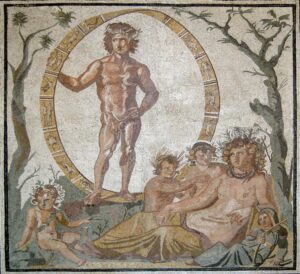
Prometheus felt their imprisonment was so unjust and could not stand the sight of Uranus being so cruel towards his children. Chronos noticed that the rest of the Titans felt the same way, and so he saw this as an opportunity to free them, creating an alliance between races. On this day, their almighty father Uranus became distracted by the wake of destruction caused by the release of the Hecatonchires and Cyclops. But, before there was a chance to react, Prometheus and his brothers swiftly ambushed Uranus, the god of the sky. The Titans stood on each corner of the earth using their unimaginable strength to wrestle with the sky god until they were able to hold each limb down. Then, his oldest brother Chronos used his sickle to castrate him, which in turn forever separated the earth and sky.4 After doing so, the Cyclops and Hecatonchires were thrown back into Tartarus by Chronos to spend the rest of time in the underworld. The new king who had just usurped his father was now the ruler of earth and the divine realm, although he would soon learn there would come to be a heavy price to pay for such actions. Cursed for defiling him, Uranus made a prophecy that one day Prometheus’ brother shall be betrayed by a child of his own for the greatest title of all, God of gods.
After learning of his curse, Prometheus could do nothing but watch as Chronos began to consume each of his children the moment they were born. At this moment, Prometheus began seeing his sibling turning into his father, Uranus as he robbed the children of their life one by one. It wasn’t long after this happened that Prometheus could feel that the tides were about to turn. That was when Chronos’ wife Rhea, the great Titan god of healing, ended up tricking Chronos into eating a rock wrapped in cloth instead of her newborn son in hopes of raising her last and only child Zeus in secret.5 With the help of his mother, Zeus was raised in secret until he was old enough to sneak into his father’s kingdom to trick him into drinking poison, thus regurgitating Zeus’ siblings. Prometheus and the rest of the Titans could not believe their eyes as the children emerged not as babies but as fully grown gods. No one had thought that within the time they had spent inside of Chronos’ stomach, these children would not succumb to an early death but instead grow in what would have been eternal darkness. Zeus, along with the older children Hades and Poseidon, then raged war on Chronos. Now these new gods were tremendously strong but lacked experience. At their current stage, they were still capable of doing things we have to concentrate on as humans to achieve with a simple flick of the wrist. Surprisingly, they were also incredibly witty even without having experienced contact with any living being. With all of them together now, they devised a strategy to overcome the tyrant, Chronos.
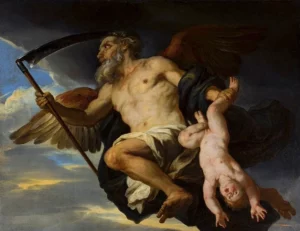
Prometheus was filled with hate towards Chronos’ oppression of the world and his lack of empathy for even his own family. At this time, he knew that he wanted nothing to do with his brother’s actions, but unwillingly had to succumb to his every command or else face exile. He was only waiting for his moment to turn against the cruel king. With the opportunity now at hand, he learned that while in hiding, Zeus was taught stories of the mighty Cyclops and Hecatonchires who were currently imprisoned by his father Chronos. The cunning young god knew that without help he and his siblings would only become prisoners or slaves for retaliating. So came the day, he released the Cyclops and Hecatonchires to help him and the other gods defeat Chronos and the eleven other Titans that sided with him. This is what started the ten-year war that would be known as one of the greatest father-and-son fights of all time.6 Chronos was not loved by any and Prometheus undeniably knew that if the new gods had strength in numbers, the almighty Titans would not stand a chance. Zeus had already begun begging every ancient creature from around the world for help. As their numbers grew in strength it was only inevitable that the Titans needed more help against the new generation. It wasn’t long until they started defeating Prometheus’ siblings one by one until the calamity had already been four years and going. Now, Zeus and the others created Mount Olympus for their own and built a castle of war from which they could see the Titans atop Mount Othrys, and between the vast amount of land that would soon become their brutal battlefield. Prometheus the Titan of wisdom knew the Olympians held a greater power and was upset that the others couldn’t see it.
Each moment this war continued, the Titans were losing ground, support, and morale. Despite all his siblings and their power against the Olympians, they kept evading them. He prophesized that it would eventually come down to who had more might and the Titans would be defeated. It wasn’t until the gates of Tartarus were once again forced open by Zeus that this forethought unfolded.7 This caused Prometheus to persuade his closest brother Epimetheus to turn on their brothers and sisters and join the fight on Zeus’ side as an ally instead of assisting in their oppression of freedom. So, as the Hecatonchires, Cyclops, and both Titans joined the Olympian’s army, and now, the greatest battle of all time was to be underway. Chronos the master of time, ruler of the universe itself, and Zeus the golden child were on the verge of repeating history. Working as one, the Olympians and monstrous creatures fought against Chronos and his army until they cornered them on the edge of the underworld. With one final force of nature, the Titans were pushed into Tartarus and sealed away forever by Zeus himself. Prometheus and Epimetheus watched their brothers and sisters plunge into an eternal darkness, as they could only hope to never succumb to such a cruel punishment. As the worst to come was finally over, Zeus allowed the Cyclops and Hecatonchires to remain free and became the sole guardians of Tartarus, blessed with the chance to forever watch over the Titans’ imprisonment. Meanwhile, Prometheus was now an eternal ally to the almighty gods after helping them battle against the Titans. Following this event, as a reward, he was given a task from Zeus to create mankind. Without hesitation, he raced down to Earth from Mount Olympus and went straight to work. By using water and mud the Titan created enormous mounds of clay next to him. Then one by one he began sculpting each human into the image of the gods themselves. Upon finishing all of his clay sculptures, he showed the gods his creations, proud of what he had achieved. Then Athena, a god of war, wisdom, and handicraft was so impressed that she decided to give each of the sculptures the gift of life.8 Today, it is still said that when Prometheus was done with his job there were only two small boulders left and these are all that remains of the clay from which all mankind was created.
After his amazing accomplishment, he was so proud of his creations, and he had grown empathy for all humanity. We know that Prometheus was different than the gods not only because he’s a Titan, but also because he had a kind heart. The gods saw humans as pawns and believed they could control their lives, but he saw humans as friends, even equals. Prometheus always disagreed with the way the gods were treating the weaker humans. At first, he stood aside as Zeus made humans live in darkness and ignorance, forcing them to worship the gods and make sacrifices from only the best there is to offer on earth. The new God of the gods was satisfied and even pleased with the way people of earth were living, whereas Prometheus was pained to see these human beings tortured by the gods, stuck, powerless, and in the cold. He then committed himself to helping his greatest achievement. So, Prometheus decided to speak with Zeus and convince him to offer humans fire to keep them warm and to help them live. Yet, the God of the gods refused to offer anything to humanity, stating that it would make them greedy and powerful.

Prometheus was furious with Zeus’s answer. He did not understand his reasoning and thought of it as an excuse to just torture mankind more. His impulsive thoughts unwillingly took over his mind and body as he came to a resolution: he was going to steal the fire from Zeus’s temple and offer it to humanity. As their creator, he could not stand the idea of humans living in darkness and ignorance. Prometheus, being known for his intelligence, worked on a plan as the Titan headed to the Temple of the Gods on Mount Olympus. Shortly after, there it was, he simply had to steal fire from Hephaestus, the god of the forge, fire, and craft.9 Hephaestus, the blacksmith among the gods, owned a great forge that became the birthing place of all their weapons. From this came things such as Athena’s spear, and Zeus’ thunderbolts, along with other weapons such as the bow and arrows for Artemis, and Apollo’s chariot. His forge was also home to the fire of the gods. If Prometheus could somehow give it to the people of Earth, their lives could forever change for the better. So it began, as he embarked on his journey to the almighty temple. First, he crossed through the perilous Dark Forest, full of nightmares and monsters. Traveling as swiftly as he could to get to the top of Mount Olympus, ready to disobey the gods for humans’ greater good. Prometheus could only think about the disparity of his creation. As he almost got to his destination, his excitement started to rise as well as his stress. Mind and body were both on a single mission as he immediately raced to Hephaestus’s workshop. Unnoticed and unannounced he then hid the fire of the gods in a stalk of fennel built the night before. Quickly Prometheus has to escape and head down to earth so he could gift it to humanity. But without ever seeing fire before, mankind was terrified by it. The humans thought that the gods were punishing them, and it was brought down to earth to hurt everyone. However, Prometheus quickly taught them how to use it and started using stones and lumber to build a fire. After asking them to get close to it, he showed how warm it felt and told them that they could even cook their food with it. Finally, after seeing the light, they were ecstatic and began celebrating their freedom from the dark age.
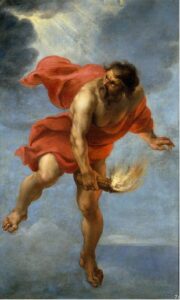
The great Titan Prometheus always felt pity for the humans. He was looking for equality between humanity and divinity, and he thought that fire would be the answer, but he knew that humans needed more to survive. So along came his teachings of life, such as mathematics, astronomy, architecture, reading, and writing.10 Now, humans rapidly learned how to use not only fire to their advantage but also innovation and creativity while creating towns and villages as Prometheus’ knowledge was spread from person to person. Some people sailed the seas, and others became blacksmiths, while a technological revolution was underway. Prometheus’ fire brought the rise of human civilization, it created kings as well as slaves, both of which started to question the power of the gods. When Zeus found out, he was infuriated with Prometheus. His madness turned into storms, destroying every ship that sailed and putting out every fire that was lit. Outraged and seeking revenge, Zeus wanted to prove to Prometheus and to the other gods how inferior humanity was. Hephaestus, the god of crafting, was now ordered to create a woman from the mud of earth. This woman would come to be known as Pandora. She was individually bestowed with gifts from each of the gods and became irresistible to all who laid eyes upon her.11 Previously when they had turned against their own siblings, Prometheus warned his brother Epimetheus that any gift from Zeus shall be known not as a friendly gesture or blessing but as a curse waiting to be unleashed. However, his brotherly advice didn’t stick with Epimetheus because he only took one look at Pandora and he found himself madly in love and obsessed with this false woman presented before him. The day they were married Hermes gifted Pandora a beautifully engraved box from Zeus and was told to never open it under any conditions.12 Somehow with the gift of foresight, Prometheus knew this simple gesture was somehow only the beginning of painful death and agony on earth. It wasn’t until the day her curiosity overcame her that Pandora inevitably opened the box thinking maybe it could be a beautiful gift or treasure from the god of Olympus. At first, it seemed empty until suddenly everything violently erupted from Pandora’s box. All at once disease, hate, jealousy, and even death were unleashed all across the world.13
Prometheus was then sent to Mount Caucasus and was strapped to a rock with unbreakable chains by Zeus as a punishment for rebelling against him. Even worse, the God of gods sent an eagle to feed on Prometheus’s liver every day for eternity.14 Humans were once again gravely punished by the God Zeus as the false human Pandora, who brought all the negative aspects of life, including war and illnesses, to humanity. Many years went by, and Prometheus remained under the curse of the powerful Zeus. It wasn’t until one day, when there was a half-god, half-mortal named Heracles came before the Father of gods and men and asked him to free the Titan. Heracles was the son of Zeus and had been known for his strength and bravery. He wanted to release the fire bringer only from the pureness of his heart, to liberate him from his misery and torture. Heracles then headed to Mount Caucasus and with one strike, liberated the Titan from the shackles with his incredible strength and beheaded the eagle.15 Of course, Zeus ridiculed and immediately opposed him but it meant that the giver of fire would be free from unjust punishment. Prometheus never regretted giving fire to his creations and could now guide them towards a peaceful rich life as it should be on Earth. Forever keeping one eye on the gods and the other on humanity, he could rest knowing that there is still good on Earth.
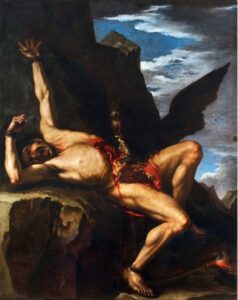
- Christopher Moore, “‘Promētheia’ (‘forethought’) Until Plato,” The American Journal of Philology 136, no. 3 (2015): 381–420, https://www.jstor.org.blume.stmarytx.edu:2048/stable/24560621. ↵
- D. S. Lamb, “Mythical Monsters,” American Anthropologist 2, no. 2 (1900): 277–91, https://www.jstor.org.blume.stmarytx.edu:2048/stable/659242. ↵
- D. S. Lamb, “Mythical Monsters,” American Anthropologist 2, no. 2 (1900): 277–91, https://www.jstor.org.blume.stmarytx.edu:2048/stable/659242. ↵
- Paul Cheshire, “Powys’ Cronos: Punishment, Rebellion and the Golden Age,” The Powys Journal 33 (2023): 79–99, https://www.jstor.org/stable/27223425. ↵
- Mike Greenberg, “The Marriage of Cronus and Rhea: A Relationship Explained,” February 22, 2021, https://mythologysource.com/relationship-between-cronus-and-rhea/. ↵
- Thomas Gregory, “Titanomachy: The War of The Gods | History Cooperative,” July 24, 2022, https://historycooperative.org/titanomachy/. ↵
- “Hades Gate,” Age of Empires Series Wiki, February 12, 2024, https://ageofempires.fandom.com/wiki/Hades_Gate. ↵
- “Greek Mythology Stories Creation Man Prometheus,” https://www.desy.de/gna/interpedia/greek_myth/creationMan.html. ↵
- Mark Cartwright, “Prometheus,” World History Encyclopedia, https://www.worldhistory.org/Prometheus/. ↵
- “Prometheus: Stealing Fire from the Gods,” National Museums Liverpool, https://www.liverpoolmuseums.org.uk/world-museum/greek-myths-and-legends/prometheus-stealing-fire-gods. ↵
- “Myth of Pandora, the First Woman on Earth – Greek Myths | Greeka,” Greekacom, https://www.greeka.com/greece-myths/pandora/. ↵
- “Pandora | Myth & Box | Britannica,” https://www.britannica.com/topic/Pandora-Greek-mythology. ↵
- “Pandora | Myth & Box | Britannica, https://www.britannica.com/topic/Pandora-Greek-mythology. ↵
- Aishwarya Joshi, “The Promethean Human Spirit,” A Different Age (blog), July 12, 2020, https://medium.com/a-different-age/the-promethean-human-spirit-a2a958db50a8. ↵
- “PROMETHEUS – Greek Titan God of Forethought, Creator of Mankind,” https://www.theoi.com/Titan/TitanPrometheus.html. ↵


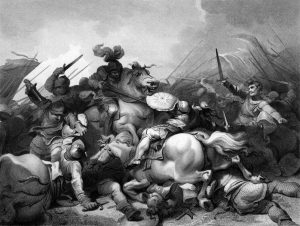
1 comment
Roger H.
The eternal, timeless and universal battle between good and evil, between salvation and damnation, between the humanly-inner caring Gods (Olympians) and selfish Mortals (Titans), between torch-passing from old to young generations, All that and more is meticulously storied, eloquently narrated and comparatively portrayed by the author.